The Indispensable Role of Handheld Plastic Extrusion Welders in Modern Industry
In the realm of advanced material fabrication, the precision and durability of plastic welding are paramount. For engineers and fabricators working with thermoplastic materials, the ability to create robust, leak-proof joints in challenging environments is critical. This is where the hand held plastic extrusion welder emerges as an indispensable tool, combining portability with industrial-grade welding power. These devices are crucial for applications ranging from civil engineering to chemical processing, ensuring structural integrity and longevity of plastic assemblies.
The demand for high-performance plastic components continues to escalate across various sectors, driven by their excellent corrosion resistance, reduced weight, and design flexibility. Effective welding of these materials requires specialized equipment that can deliver controlled heat and consistent material flow, guaranteeing homogeneous and strong welds. This article delves into the technical aspects, applications, and strategic advantages of this vital equipment, highlighting its impact on modern manufacturing and repair processes.
Industry Trends and Market Dynamics
The global market for plastic welding equipment is experiencing steady growth, propelled by the expanding use of thermoplastics in infrastructure, automotive, chemical, and waste management industries. Key trends include the increasing adoption of high-density polyethylene (HDPE), polypropylene (PP), and polyvinylidene fluoride (PVDF) due to their superior chemical resistance and mechanical properties. This growth trajectory necessitates advanced welding solutions capable of handling diverse polymer types and demanding application environments.
One significant trend is the shift towards more portable and energy-efficient welding technologies. End-users are increasingly seeking equipment that offers greater flexibility for on-site repairs and installations, reducing downtime and operational costs. Environmental regulations also play a role, pushing for welding methods that minimize material waste and ensure long-term structural integrity, thus preventing leaks and environmental contamination. Forecasts suggest a compounded annual growth rate (CAGR) of approximately 4.5% for plastic welding equipment through 2028, with handheld extrusion welders being a significant contributor to this expansion due to their versatility and ease of deployment.
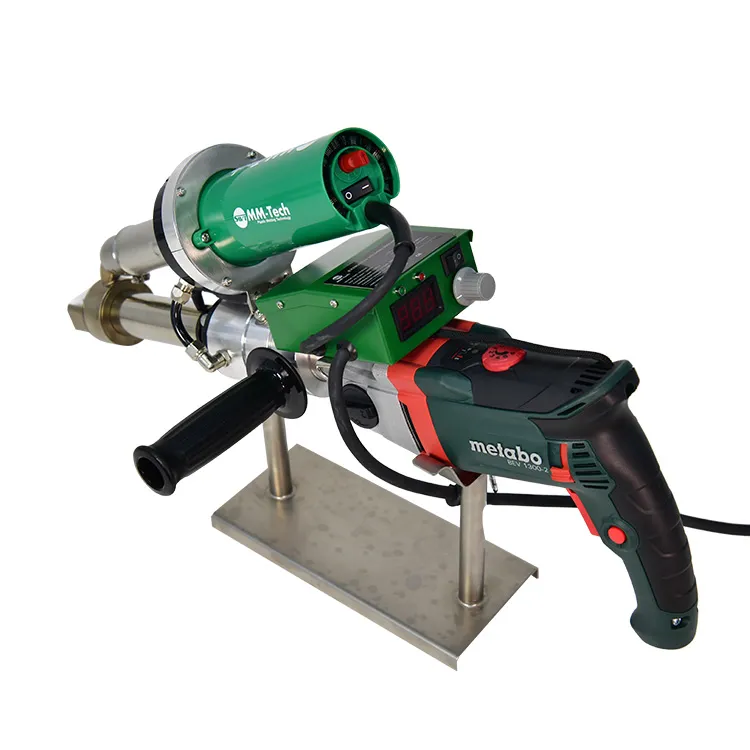
Fig. 1: Modern hand held plastic extrusion welder in operation.
SWT-NS610A Handheld Plastic Extrusion Welder: Technical Specifications
The SWT-NS610A exemplifies the cutting-edge of portable plastic welding technology, designed for robust performance in demanding industrial settings. This hand held plastic extrusion welder integrates advanced heating and extrusion mechanisms to deliver superior weld quality for various thermoplastic materials.
Key Technical Parameters of SWT-NS610A
| Parameter | Value | Description |
|---|---|---|
| Voltage | 220V (Single-Phase) | Standard industrial power supply. |
| Power Output | 3400W (Total) | High power for rapid heating and stable extrusion. |
| Welding Rod Diameter | 3.0mm – 5.0mm | Accommodates various welding rod sizes for different joint configurations. |
| Extrusion Output | 2.0 kg/h – 3.5 kg/h (HDPE) | Variable output for different welding speeds and material requirements. |
| Weight | 6.8 kg | Optimized for handheld operation and portability. |
| Temperature Control | Digital, PID Controlled | Precise temperature regulation for consistent weld quality. |
| Pre-heating Temperature | 20°C – 600°C | Wide range for various thermoplastics and ambient conditions. |
| Extrusion Temperature | 20°C – 300°C | Adjustable for optimal material flow and fusion. |
| Materials Weldable | HDPE, PP, PVDF, PVC | Versatile for a broad spectrum of industrial plastics. |
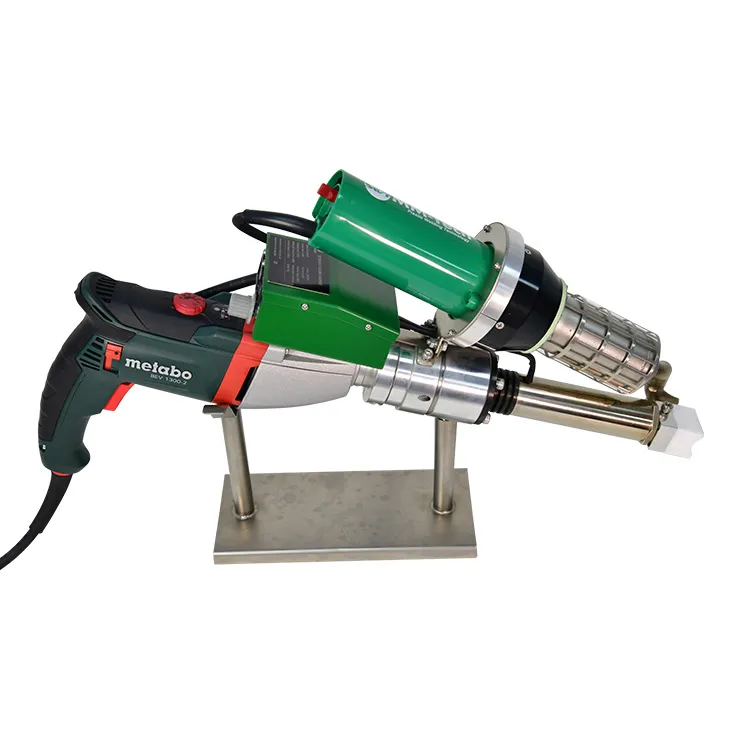
Fig. 2: Detailed view of the SWT-NS610A hand held plastic extrusion welder components.
Manufacturing Process Flow of Handheld Plastic Extrusion Welders
The manufacturing of a high-quality hand held plastic extrusion welder is a meticulous process, combining precision engineering with robust material selection to ensure durability and performance. It adheres to stringent quality control standards, such as ISO 9001, to guarantee reliability.
Process Overview:
- Material Sourcing & Quality Inspection: High-grade alloys (e.g., stainless steel for heating elements, aerospace-grade aluminum for housing) are sourced. Raw materials undergo rigorous testing for chemical composition, mechanical properties (tensile strength, hardness), and dimensional accuracy, adhering to ASTM and DIN standards. Polymers for non-conductive parts are selected for high-temperature resistance and dielectric strength.
-
Component Manufacturing:
- Casting/Forging: Components requiring exceptional strength and thermal stability, such as the extrusion screw base, may undergo precision casting or forging processes.
- CNC Machining: Critical components like the extrusion screw, heating chamber, and nozzle mounts are fabricated using multi-axis CNC machining centers. This ensures tight tolerances (e.g., ±0.01mm) crucial for efficient material flow and consistent heating.
- Heating Element Production: High-resistance alloys (e.g., Nichrome) are precisely coiled and insulated within ceramic or mica casings, designed for optimal heat transfer and longevity.
- Electronic Assembly: Control boards, temperature sensors (thermocouples), and digital displays are assembled and calibrated. Each circuit board undergoes functional testing for accuracy and stability.
- Surface Treatment & Finishing: Metal parts undergo treatments such as anodizing or powder coating for enhanced corrosion resistance, abrasion resistance, and aesthetic finish. This extends the service life, particularly in harsh industrial environments.
- Assembly: Skilled technicians meticulously assemble the pre-fabricated components. This includes integrating the motor, gearbox, heating elements, extrusion screw, and control panel. Wiring is routed and secured according to electrical safety standards (e.g., IEC).
-
Calibration & Testing:
- Temperature Calibration: The PID control system is calibrated to ensure accurate and stable temperature output for both the pre-heating air and the extrusion melt.
- Extrusion Rate Verification: The motor speed and gearbox are tested to ensure consistent and controllable extrusion rates.
- Electrical Safety Tests: Dielectric strength, ground continuity, and insulation resistance tests are performed per ANSI and CE standards.
- Functional Weld Test: Each unit undergoes a trial weld on standard thermoplastic sheets (e.g., HDPE) to verify weld strength, bead consistency, and overall operational performance.
- Final Inspection & Packaging: A final visual and functional inspection is conducted before packaging the unit with user manuals, safety guidelines, and accessories for shipment.
The rigorous adherence to international standards during manufacturing ensures that the service life of these welders is optimized, often exceeding 5-7 years with proper maintenance, even under heavy industrial use.
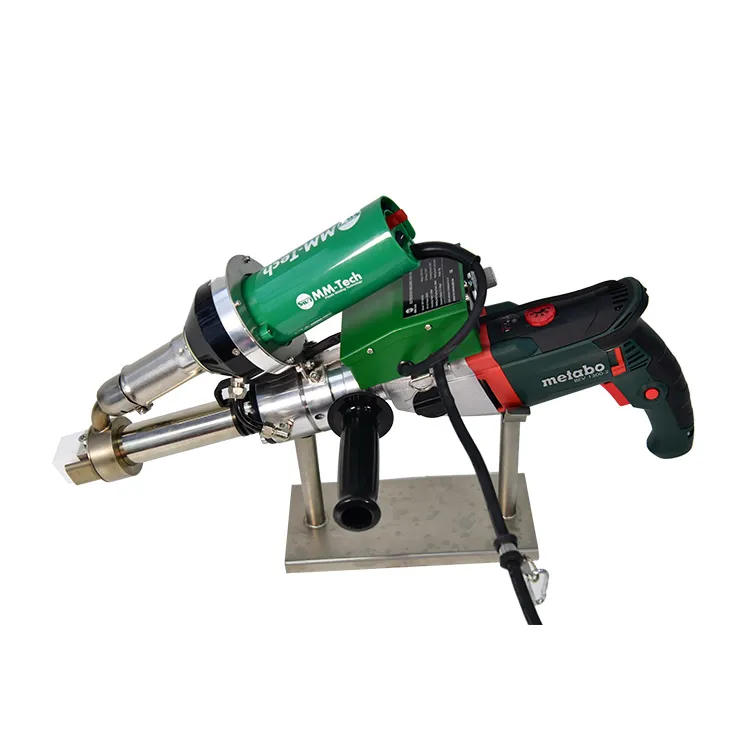
Fig. 3: Precision engineering and assembly of a hand held plastic extrusion welder.
Application Scenarios and Target Industries
The versatility and robustness of a hand held plastic extrusion welder make it an essential tool across a multitude of industries where plastic fabrication, repair, and lining are critical. Its ability to perform high-quality welds in situ provides significant operational advantages.
Target Industries:
- Petrochemical and Chemical Processing: For welding corrosion-resistant linings in storage tanks, reactors, and pipelines (e.g., HDPE, PP, PVDF liners) that handle aggressive chemicals.
- Water Supply & Drainage / Environmental Engineering: Essential for geomembrane welding in landfill liners, wastewater treatment ponds, reservoirs, and aquaculture facilities. Also used in the fabrication and repair of large-diameter plastic pipes for municipal water systems.
- Mining and Geotechnical Engineering: Used for welding geomembranes to prevent leachate seepage in tailing dams and heap leach pads, and for lining process tanks.
- Agriculture: For pond liners, irrigation system repairs, and agricultural tank fabrication.
- Marine and Aquatics: Repair of plastic boats, pontoons, and construction of specialized aquatic equipment.
- HVAC and Ventilation Systems: Fabrication and repair of corrosion-resistant plastic ducting.
Typical Application Scenarios:
- Tank and Container Fabrication/Repair: Creating robust, leak-proof seams for plastic storage tanks, especially those used for corrosive liquids. This includes the welding of internal baffles or external reinforcements.
- Pipe Welding and Fitting: Joining sections of large-diameter plastic pipes or attaching fittings and branches in complex piping networks, ensuring continuous material integrity.
- Geomembrane and Liner Installation: Sealing geomembranes in environmental containment projects, ensuring an impermeable barrier against contaminants. The handheld nature allows for precise work in corners and tight spaces.
- Plastic Sheet Fabrication: Welding large plastic sheets to form custom structures, covers, or protective barriers.
- On-site Repairs: Crucial for repairing cracks, tears, or damaged sections in existing plastic installations without requiring complete disassembly or removal, thus offering significant energy saving and cost advantages.
The primary advantages in these scenarios include superior corrosion resistance of the welded plastics, preventing leaks and extending asset life, and often significant energy saving compared to traditional material joining methods that might require more extensive preparation or heating. The ability to perform repairs on-site drastically reduces material and labor costs.
Technical Advantages of Advanced Handheld Extrusion Welders
Modern hand held plastic extrusion welder units offer a suite of technical advantages that differentiate them from conventional heat welding or fusion techniques. These benefits translate directly into improved weld quality, operational efficiency, and enhanced safety.
- Homogeneous Weld Seams: Extrusion welding introduces pre-plasticized filler material directly into the joint, creating a truly homogeneous weld zone that is often stronger than the parent material itself. This deep penetration and fusion minimize voids and ensure consistent mechanical properties across the weld.
- Precise Temperature Control: Advanced welders feature PID (Proportional-Integral-Derivative) controllers for both the hot air pre-heat and the extrusion melt temperatures. This precision prevents material degradation due to overheating and ensures optimal molecular entanglement, critical for polymers like PVDF which have narrow processing windows.
- High Extrusion Output and Speed: With extrusion rates up to 3.5 kg/h, these welders significantly increase productivity compared to hot-air or hot-gas welding. This high output allows for quicker completion of large projects and reduces labor costs.
- Ergonomic Design and Portability: Weighing around 6.8 kg, units like the SWT-NS610A are designed for prolonged operation without excessive operator fatigue. Their compact form factor and balanced weight distribution facilitate easy maneuverability in confined spaces or overhead applications.
- Versatility in Material Handling: Capable of welding a wide range of thermoplastics, including HDPE, PP, PVDF, and PVC, using matching welding rods. This versatility reduces the need for multiple specialized tools.
- Digital Monitoring and Diagnostics: Integrated digital displays provide real-time feedback on critical parameters such as temperature and motor speed, enabling operators to maintain optimal welding conditions and troubleshoot efficiently.
- Enhanced Safety Features: Built-in safeguards such as overload protection for the motor and heating elements, and intelligent cold-start prevention, protect both the equipment and the operator.
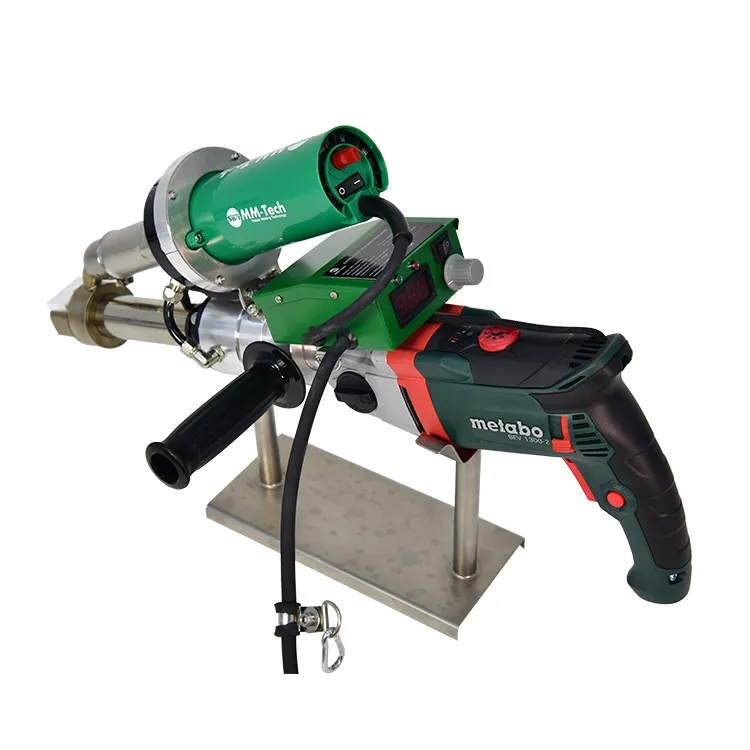
Fig. 4: Ergonomic design allowing for precision in difficult welding positions.
Vendor Comparison and Customized Solutions
When selecting a hand held plastic extrusion welder, B2B buyers consider not only technical specifications but also the reliability of the supplier, customization options, and after-sales support. Reputable extrusion welder suppliers differentiate themselves through expertise and comprehensive service.
Key Differentiation Factors Among Suppliers:
| Factor | Premium Supplier (e.g., MM-Techweld) | Standard Supplier |
|---|---|---|
| Product Quality & Durability | Robust construction, high-grade components (e.g., Swiss motors), ISO/CE certified, extended service life. | Basic materials, shorter lifespan, potential for inconsistent performance. |
| Technical Support & Expertise | Experienced engineers, comprehensive training, rapid response to technical queries, deep application knowledge. | Limited support, basic troubleshooting guides, less application-specific advice. |
| Customization & Flexibility | Offers specialized nozzles, welding shoes, and process parameter adjustments for unique applications or materials. | Primarily off-the-shelf products, limited adaptation. |
| Warranty & After-Sales | Extensive warranty (e.g., 1-2 years), readily available spare parts, professional repair services. | Shorter warranty, difficulties with spare parts or repairs. |
| Certifications & Compliance | ISO 9001, CE, RoHS compliance, adhering to international safety standards. | May lack comprehensive certifications, potentially compromising safety or quality. |
Customized Solutions:
For complex projects, standard welding equipment may require adaptation. Leading extrusion welder suppliers often provide bespoke solutions, including:
- Specialized Nozzles and Welding Shoes: Custom-fabricated nozzles for specific joint geometries (e.g., tight corners, complex curves, V-grooves) or materials with unique flow characteristics.
- Material-Specific Configurations: Optimization of heating profiles and extrusion speeds for exotic thermoplastics or composite plastics that require precise thermal management.
- Accessory Integration: Development of tailored stands, guides, or external feed systems for large-scale production or automated processes.
- Training Programs: Specialized training for operators and maintenance personnel on advanced welding techniques and equipment optimization for specific project requirements.
Engaging with knowledgeable extrusion welder suppliers who understand application-specific challenges is paramount for long-term project success and operational efficiency.
Application Case Studies: Real-World Impact
The practical application of a hand held plastic extrusion welder in industrial settings consistently demonstrates its value through improved efficiency, durability, and cost-effectiveness. Here are illustrative case studies:
Case Study 1: Chemical Storage Tank Lining in a Petrochemical Plant
A major petrochemical facility faced challenges with corrosion in its steel chemical storage tanks. The solution involved lining the tanks with 5mm thick HDPE sheets to provide superior chemical resistance. The intricate internal structure of the tanks, including baffles and pipe entries, demanded a highly maneuverable welding solution. Using a SWT-NS610A hand held plastic extrusion welder, technicians were able to precisely weld all seams and connections, achieving a consistent, leak-proof barrier. The project, initially projected for a 12-week shutdown, was completed in 8 weeks due to the high welding speed and reliability of the extrusion welder. Post-installation testing confirmed zero leakage, significantly extending the service life of the tanks and enhancing safety for corrosive chemical storage.
Case Study 2: Municipal Wastewater Treatment Pond Geomembrane Repair
A municipal wastewater treatment plant identified a small tear in the HDPE geomembrane lining of one of its aeration ponds, risking groundwater contamination. Traditional repair methods would have required draining the large pond, leading to significant operational disruption and costs. A team deployed a portable hand held plastic extrusion welder to perform an on-site patch repair. The welder’s ability to create strong, consistent welds in a challenging outdoor environment proved critical. Technicians prepared the area, applied a new HDPE patch, and seamlessly fused it to the existing liner. The repair was completed in less than a day, minimizing downtime, preventing environmental leakage, and saving the municipality substantial costs associated with water redirection and refilling. The weld surpassed the required environmental safety standards for impermeability.
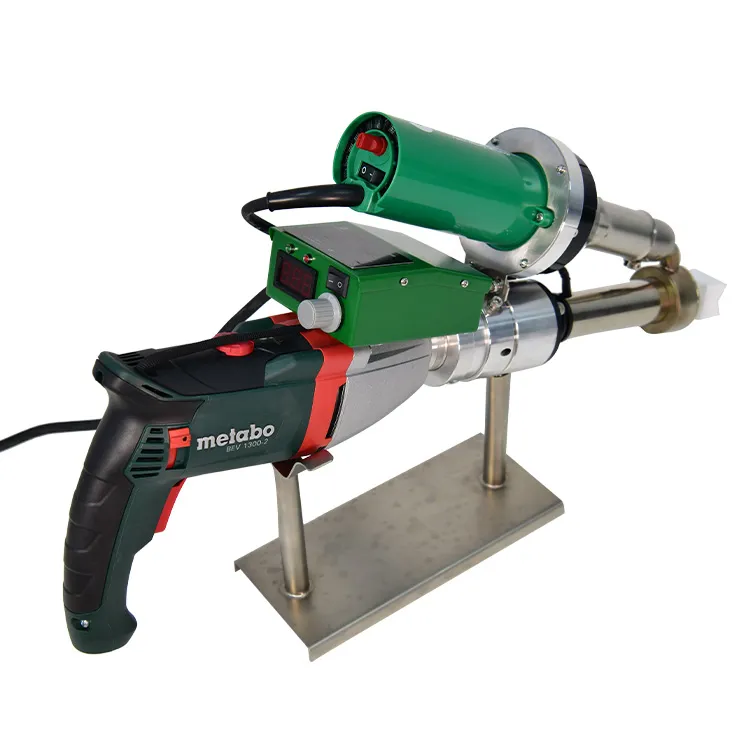
Fig. 5: On-site repair with a hand held plastic extrusion welder demonstrating precision and efficiency.
Frequently Asked Questions (FAQ)
-
Q: What materials can the SWT-NS610A hand held plastic extrusion welder weld?
A: The SWT-NS610A is highly versatile and capable of welding a wide range of thermoplastics, including HDPE (High-Density Polyethylene), PP (Polypropylene), PVDF (Polyvinylidene Fluoride), and PVC (Polyvinyl Chloride), provided the appropriate welding rod is used.
-
Q: What are the primary advantages of extrusion welding over hot-air welding?
A: Extrusion welding offers superior weld strength, deeper material penetration, higher extrusion output for faster work, and greater consistency, especially for thicker materials (typically 4mm or more). It introduces pre-plasticized material, resulting in a more homogeneous and robust joint compared to simply heating and pressing existing material.
-
Q: How do I select the correct welding rod?
A: The welding rod material must match the base material being welded (e.g., HDPE rod for HDPE sheets). The diameter of the welding rod should also be within the specified range of the welder (e.g., 3.0mm-5.0mm for SWT-NS610A).
-
Q: Is specialized training required to operate an extrusion welder?
A: While the SWT-NS610A is designed for user-friendliness, formal training is highly recommended to ensure optimal weld quality, safety, and efficient operation, especially for critical industrial applications. Training typically covers equipment setup, parameter adjustment, welding techniques, and maintenance.
Lead Time, Warranty, and Customer Support
Understanding the logistics and support structure is crucial for B2B procurement. We strive for transparency and excellence in all aspects of service.
Lead Time & Fulfillment:
Standard orders for the SWT-NS610A hand held plastic extrusion welder typically have a lead time of 7-14 business days, depending on current stock levels and order volume. For large quantities or customized configurations, lead times will be provided upon request, often ranging from 3-6 weeks. We maintain robust logistics partnerships to ensure timely and secure delivery worldwide.
Warranty Commitments:
All SWT-NS610A units come with a comprehensive 12-month manufacturer’s warranty covering defects in materials and workmanship. Key components such as the motor and heating elements often carry extended warranties of up to 24 months, underscoring our confidence in product durability. Specific warranty terms are detailed in the product documentation provided with each unit. Customers are encouraged to register their products to facilitate efficient service.
Customer Support:
Our commitment to customer satisfaction extends beyond the sale. We offer multi-channel customer support including:
- Technical Assistance: A dedicated team of experienced engineers available via phone and email to assist with operational queries, troubleshooting, and application advice.
- Spare Parts & Consumables: A readily available inventory of genuine spare parts and welding consumables to minimize downtime.
- Repair Services: Authorized service centers capable of performing maintenance and repairs, ensuring your equipment operates at peak performance.
- Training Programs: On-site or remote training sessions to ensure operators are fully proficient in using our equipment safely and effectively.
Our products adhere to international standards such as ISO 9001 for quality management and CE marking for European market compliance, affirming our dedication to quality and safety.
Conclusion
The evolution of the hand held plastic extrusion welder represents a significant advancement in plastic fabrication and repair. Offering a robust combination of power, precision, and portability, these tools are pivotal for industries demanding high-integrity plastic welds in diverse and challenging environments. The SWT-NS610A, with its advanced technical specifications and versatile application capabilities, stands as a testament to this technological progress. By ensuring superior weld quality, operational efficiency, and long-term reliability, handheld extrusion welders remain an essential investment for any organization engaged in the critical field of thermoplastic engineering.
References
- 1. American Welding Society (AWS). “AWS D16.4:2006 – Specification for the Qualification of Robotic Arc Welding Personnel.”
- 2. International Organization for Standardization (ISO). “ISO 12176-1:2008 – Plastic pipes and fittings – Equipment for fusion welding polyethylene systems – Part 1: Butt fusion.”
- 3. Plastics Pipe Institute (PPI). “Handbook of Polyethylene Pipe, 2nd Edition.”
- 4. GfK Market Research. “Global Plastic Welding Equipment Market Analysis, 2022-2028.”
MM-Tech, established in 2011, is a leading manufacturer of thermoplastic welding equipment in China.hot air plastic welder We specialize in the research, development, production, and sales of thermoplastic welding equipment.hot air welding gun Our product line is extremely rich, covering geomembrane welders, polymer hot air welders, tarpaulin hot air welders, hot air welders, hand extrusion welders, and various welding tools, comprehensively meeting the diverse needs of both on-site construction and workshop operations.hot air welder roofing Our products have been exported to over 100 countries and have won the trust of more than 3,000 customers.plastic welding heat gun|super blog